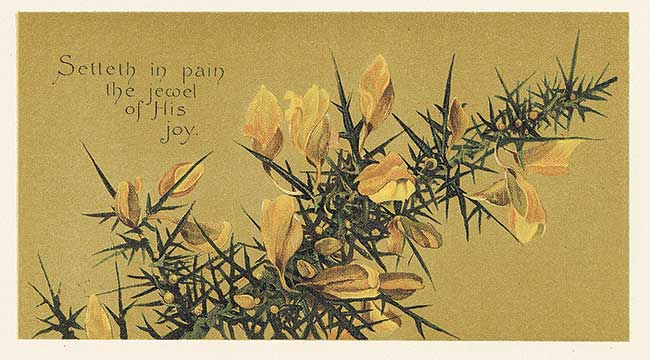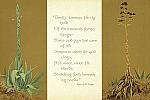“The marvel of springtime”

[Lilias Trotter, Plate from Parables of the Cross, c. 1895—Used by permission of Lilias Trotter Legacy and Arab World Ministries of Pioneers]
Trotter’s Parables of the Cross (written c. 1895, during an extended period of rest) grew out of her health struggles after seven years of ministry in Algiers.
Can we not trace the sign of the Cross in the first hint of the new spring’s dawning? In many cases, as in the chestnut, before a single old leaf has faded, next year’s buds may be seen, at the summit of branch and twig, formed into its very likeness: in others the leaf-buds seem to bear its mark by breaking through the stem blood-red. Back in the plant’s first stages, the crimson touch is to be found in seed-leaves and fresh shoots, and even in the hidden sprouts. Look at the acorn, for instance, as it breaks its shell, and see how the baby tree bears its birthmark: it is the blood-red in which the prism ray dawns out of the darkness, and the sunrise out of the night. The very stars, science now tells us, glow with this same colour as they are born into the universe out of the dying of former stars. —from “Death Is the Gate of Life”
Does anyone read these words who is trying to struggle from the natural life into the spiritual, by “some other way” than this way of the Cross? It is as impossible as it would be to pass from today into tomorrow except through the night. Your battling is a battling against God. Yield and come to His terms. Yield now.
But blessed as it is, this passage into a life of peace with Him, woe to the soul that stops there, thinking that the goal is reached, and dwindles, so to speak, into a stunted bud. Holiness, not safety, is the end of our calling. —from “Death to Sin’s Penalty Is the Way Out into a Life of Justification”
How many of the wonders wrought by Christ on earth lay in concentrating the long processes of nature into a sudden act of power. The sick would, many of them, have been healed by degrees in the ordinary course of things; the lapse of years would have brought about the withering of the fig tree; the storm would have spent itself in few hours. The miracle in each case consisted in the slow process being quickened by the Divine breath, and condensed into a moment.
Cannot we trust Him for like marvels in our souls? There, too, “a day is with the Lord as a thousand years.” There is no needs be on His part that He should prolong this first act of making us holy over the rest of our lives. A miracle—a wonder—is all that we need, and “He is the God, that doeth wonders. . . .”
Whatever is the next grace for your soul, can you believe for its supply at once, straight out from the dry, bare need? Christ’s process is very simple and very swift: “Whatsoever things ye desire, when ye pray, believe that ye receive them, and ye shall have them. . . .”
Separation from all known sin is the starting-point for sanctification, not the goal: it is only the negative side of holiness; it is only reaching the place where God can develop His ideal in us unhindered. It is when the death of winter has done its work that the sun can draw out in each plant its own individuality, and make its existence full and fragrant. Holiness means something more than the sweeping away of the old leaves of sin: it means the life of Jesus developed in us.
No matter if we feel utterly helpless before that lovely life of His. Given the conditions—the hidden power within, and the old outlets of growth shut off—the sun will do the rest; out of the midst of apparent lifelessness, of barrenness, of difficulty, the blossoms will be drawn forth. Do not let us “limit the Holy One of Israel” by putting off His power to work this miracle into a distant future. How hopeless the naked wood of a fruit tree would look to us in February if we had never seen the marvel of springtime! Yet the heavenly bloom bursts straight out, with hardly an intermediate step of new growth.
Look again at a flowering rush. The crest breaks forth from nothingness—out of the lifeless-seeming pith come crowding the golden brown blossoms, till there is hardly “room to receive” them. What more do we need for our souls than to have this God for our God?
By Lilias Trotter
[Christian History originally published this article in Christian History Issue #148 in 2023]
from “Death to Sin Is the Way Out into a Life of Holiness” in Parables of the CrossNext articles
Learning to see
John Ruskin loomed large over an art world and a culture wrestling with both truth and beauty
Kirstin Jeffrey Johnson & Jennifer TraftonMinds occupied with heaven
Organizing laypeople for piety and service in the Nineteenth Century
Kevin Belmonte







